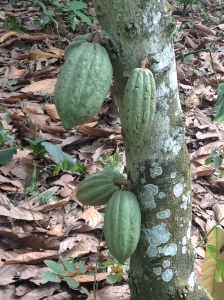Kerry McCarthy MP reports from a recent visit to Ghana:
In February I was fortunate enough to have the chance to visit Ghana, representing the UK parliament at a Westminster Foundation for Democracy conference. I took the opportunity to go out a few days earlier and on one of my free days I went to see the work of the Kuapo Kokoo cocoa growers co-operative, which supplies cocoa to Divine Chocolate, the company it owns 45% of, in the UK.
The co-operative structure, with villages grouped into collectives, and those collectives organised under an umbrella body at a regional level, means that distribution, marketing and other commercial arrangements can be done on a larger scale, ensuring the viability of the farms and continued growth. But the decisions that matter are still taken at a very local level and there is a real sense of collective purpose.
The welcome from the villagers was very warm, with the whole community gathered to meet me, and women in traditional dress bearing the Kuapo Kokoo logo and their slogan ‘Papa Paa’ –which means “the best of the best” – singing and dancing. We started with a question and answer session, sitting out in the sun, with villagers telling me how the collective was organised, what facilities had been provided – including the village school – and what more they needed – machinery, and a health centre closer to the village were top of their wishlist. Then the women gave a demonstration of their new business sideline, making soap from palm oil, a simple but strenuous process, which, again, would be made easier if/when they can afford to invest in machinery to grind the kernels down.
After this I went to look round the cocoa farms. It’s amazing how someone, somewhere, worked out that pods growing on trees, with their bitter, inedible contents, could through a process of fermentation and grinding eventually be made into the chocolate we consume in great quantities. I was shown the inside of a pod, and tried the sweet white pulp. The cocoa beans at this stage are terribly bitter, but I was shown how they are fermented under a pile of palm leaves for some weeks. They look, to be frank, rather disgusting at this stage of the process…. but they are then ground up, and eventually, further down the line, turned into the Divine chocolate we know and love.
The thing that impressed me most about the visit, apart from the warmth and hospitality shown by the farmers, was the fact that the structure manages to retain the best aspects of local, small-scale farming, where decisions are taken in the community, the benefits are felt in the community and everyone has a stake, with the advantages of organising on a larger scale, such as being able to export and reach new markets. It’s an admirable model that could be emulated elsewhere, including in the UK.







 Posted by charlottejb
Posted by charlottejb 

